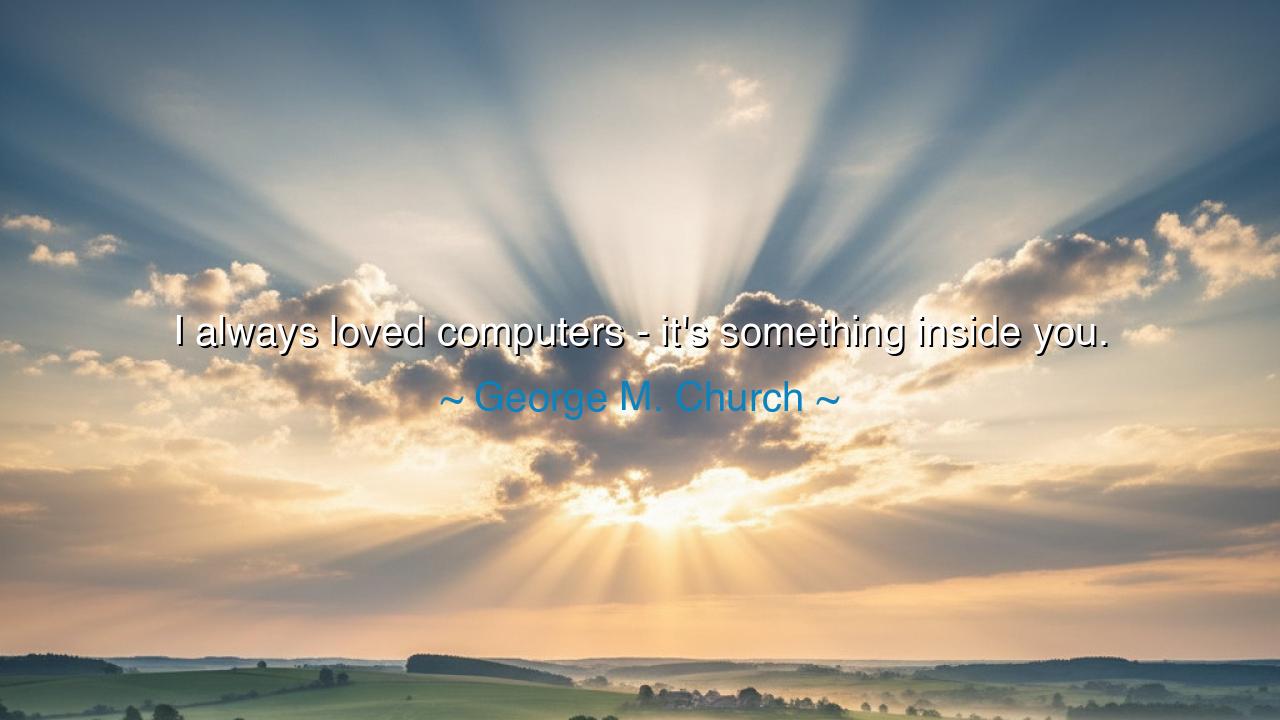
I always loved computers - it's something inside you.






In the words of George M. Church, visionary of science and father of modern genomics, we hear a confession both simple and profound: “I always loved computers — it’s something inside you.” To the untrained ear, this may sound like a statement of preference, but to the wise, it reveals a deep truth about calling, that mysterious inner force that draws a soul toward its destiny. Church does not speak of mere machines when he speaks of computers — he speaks of a kind of kinship, an echo between human thought and the logic of creation itself. For in every true passion, there is something ancient, something innate, that lives within us before we even understand it.
When he says, “it’s something inside you,” Church touches upon the essence of vocation — that fire that no teacher can ignite, for it is already burning when we are born. The ancients called it the daemon, the guiding spirit within every human being, whispering of what they were meant to do. For Church, that whisper spoke in the language of computation, the rhythm of code, the architecture of systems both natural and artificial. In this love for computers, he was not merely fascinated by silicon and circuitry, but by the way they mirrored the complexity of life itself — how the binary pulse of electricity resembled the genetic dance of DNA. His passion for machines was, in truth, a reflection of his awe for creation.
There is a sacred symmetry between the computer and the mind, between the algorithm and the soul’s curiosity. Church saw this connection, and from it he built a bridge between biology and technology, pioneering ideas that would reshape the understanding of both. But his love began long before the world called him a scientist. It began as a child’s fascination — an intuitive recognition that the patterns of the machine spoke the same language as the patterns of thought. This is the mystery he points to: that sometimes our love for a craft or field is not learned from the world, but remembered from within, as though the universe had planted it in us long ago.
History tells us of others who felt this same inner summons. Isaac Newton, when struck by the falling apple, did not suddenly invent curiosity; he merely followed a lifelong wonder toward its natural conclusion. Ada Lovelace, the first programmer, saw in Babbage’s machine not mere mechanics, but the possibility of poetry written in numbers. She, too, had that same inner light — a passion that no era could contain. These figures, like Church, remind us that to love something deeply — whether it be art, science, or creation — is to participate in the divine act of understanding. The ancients would call it “knowing the world as the gods do.”
But Church’s words are not only about destiny; they are also about identity. To love something “inside you” means that passion is not separate from self. When you work with love, you are not performing an external act; you are expressing who you are. The computer, to Church, was not a mere tool, but an extension of thought, a vessel for translating imagination into structure. It was through this love that he came to see the hidden code of life itself — to read the genome as a divine text, and to write within it new possibilities for humankind. From that union of passion and purpose, entire fields of science were born.
And yet, there is humility in his statement. For he does not boast of mastery; he speaks instead of belonging. “It’s something inside you,” he says, as though to remind us that true love for one’s craft is not a possession but a recognition — a moment when you finally understand what the universe has been asking of you all along. When a person finds that “something inside,” they cease to chase greatness and begin to embody it. The artist, the teacher, the engineer, the dreamer — all become instruments of that inner truth.
Thus, the lesson of George M. Church’s words is both timeless and personal: Listen to what stirs within you. Do not silence the call of fascination, for it is the compass of your soul. Whether your passion lies in the hum of machines, the beauty of equations, the rhythm of music, or the quiet mystery of healing — follow it. For in that pursuit lies the bridge between self and the infinite. The tools you love are not accidents; they are mirrors of your purpose.
So, children of the modern age, remember this: the world does not bestow your calling — it awakens it. As Church found his reflection in the circuitry of the computer, so too will you find yours in whatever realm your heart burns for. When you discover that “something inside you,” guard it, nurture it, and let it lead you. For that inner light, once followed, will illuminate not only your path, but the paths of generations yet to come.






AAdministratorAdministrator
Welcome, honored guests. Please leave a comment, we will respond soon